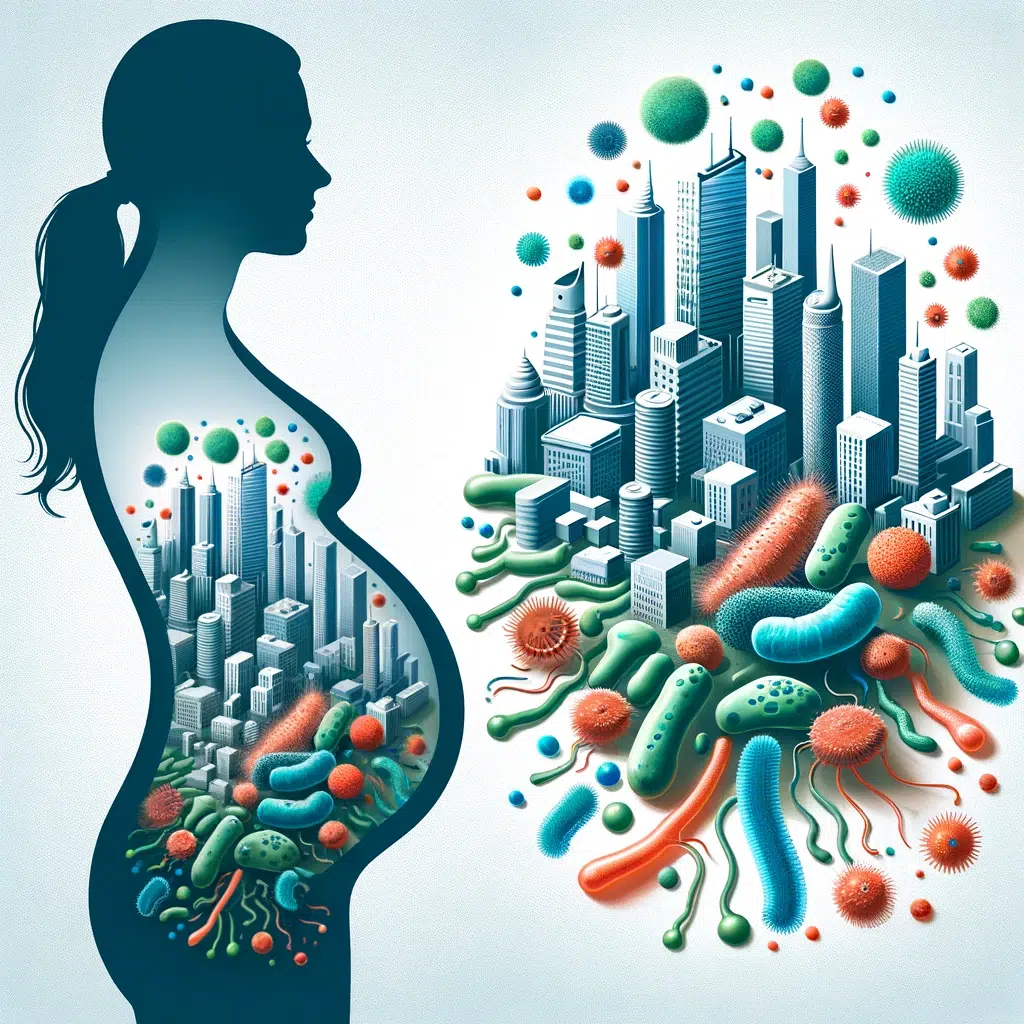Understanding Pregnancy Microbiota: The Key to Maternal and Fetal Health
Discover the profound impact of pregnancy microbiota on maternal wellbeing and fetal development, including microbiome dynamics and their influence on immune responses and pregnancy outcomes.

The journey of life begins with a symphony of cellular genetics and a diverse community of microbes, termed the 'pregnancy microbiota'.
These microbes, thriving in the gut, vagina, oral cavity, and even the placenta, are essential for robust fetal development and a well-functioning immune system.
Our understanding of these microbiome dynamics is crucial, as they not only respond to a mother's physiological changes but also shape the lifelong health blueprint of the child.
Key Points
- The "pregnancy microbiota," comprising diverse microbes in the gut, vagina, oral cavity, and placenta, is essential for fetal development and a well-functioning immune system.
- These microbiota experience dynamic shifts throughout pregnancy, birth, and early motherhood, challenging the belief that the womb is sterile and highlighting their role in shaping the child's health.
- Microbiota play a critical role in metabolism, immunity, and hormonal balance, and undergo significant shifts during pregnancy to support fetal development.
- Pregnancy brings profound changes in maternal microbiota to support fetal development, balancing hormones and immune adjustments to nurture the fetus and protect against infections.
- Gut microbiota diversifies from the first to the third trimester, influencing metabolism and immune responses, which are vital for pregnancy and fetal growth.
- Maternal microbiota is greatly influenced by dietary choices, with microbial diversity maintaining an immune system that supports healthy fetal development.
- The prenatal microbial environment and interventions like probiotic treatments can actively shape the child's future health, impacting the immune system and reducing the risk of certain conditions.
- The vaginal microbiome, particularly rich in Lactobacillus species, plays a crucial protective role during pregnancy but undergoes significant changes that affect both mother and baby's health.
- The oral microbiome of expectant mothers experiences shifts, with a higher microbial count than in non-pregnant women, raising concerns for oral health during pregnancy.
In This Article:

Navigating the Microbiome Dynamics: Enhancing Maternal and Fetal Health
The miracle of motherhood is not just a dance of hormones and growth—it's also a ballet of billions of microbes, collectively known as the pregnancy microbiota.
Recent insights have illuminated the dynamic shifts in these microscopic communities, known as microbiome dynamics, that accompany a woman's journey through pregnancy, birth, and early motherhood.
Contrary to long-held beliefs, the womb isn't a sterile sanctuary.
Research by Hu et al. (2013) A Trusted Source Hu, J., Nomura, Y., Bashir, A., Fernandez-Hernandez, H., Itzkowitz, S., Pei, Z., et al. (2013). Diversified microbiota of meconium is affected by maternal diabetes status. PLoS ONE 8:e78257. doi: 10.1371/journal.pone.0078257 PubMed AbstractCrossRef Full TextGoogle Scholar and Aagaard et al. (2014) A Trusted Source Aagaard, K., Ma, J., Antony, K. M., Ganu, R., Petrosino, J., and Versalovic, J. (2014). The placenta harbors a unique microbiome. Sci. Transl. Med. 6:237ra65. doi: 10.1126/scitranslmed.3008599 PubMed AbstractCrossRef Full Textreveals that even before birth, the fetus is introduced to its first friends—microbes that might influence its future health.
These microbial companions continue to evolve through delivery, whether by natural means or cesarean, and as the child grows, so does the complexity of their microbiota, molded by factors such as diet and environment.
Understanding this microbial mosaic is not just academic curiosity; it's a crucial element of health.
As Dunlop et al. (2015) A Trusted Source Dunlop, A. L., Mulle, J. G., Ferranti, E. P., Edwards, S., Dunn, A. B., and Corwin, E. J. (2015). Maternal microbiome and pregnancy outcomes that impact infant health: a review. Adv. Neonatal Care 15, 377–385. doi: 10.1097/ANC.0000000000000218PubMed AbstractCrossRef Full TextGoogle Scholar and Kumar and Magon (2012) A Trusted Source Kumar, P., and Magon, N. (2012). Hormones in pregnancy. Niger. Med. J. 53, 179–183. doi: 10.4103/0300-1652.107549PubMed AbstractCrossRef Full TextGoogle Scholar observed,
the harmonious interaction between our bodies and these bacteria during pregnancy could be as vital for the baby's development as it is for the mother's well-being.
This synergy has been honed over millennia, suggesting that a balanced microbiome may be central to a healthy pregnancy and a child's growth.
Embracing this understanding could unlock new research pathways and potentially guide innovative treatments, marking a new chapter in reproductive health and early childhood development.
Microbiome Dynamics: The Cornerstone of Maternal and Infant Health
Our bodies are bustling metropolises for trillions of microorganisms that make up our microbiota, playing a critical role in metabolism, immunity, and hormonal balance.

During pregnancy, these microbiome dynamics align with the mother's physiological changes to support fetal development.
This community plays a critical role in our overall health, influencing metabolism, immunity, and even hormonal balance.
Researchers Ursell et al. (2012) A Trusted Source Ursell, L. K., Clemente, J. C., Rideout, J. R., Gevers, D., Caporaso, J. G., and Knight, R. (2012). The interpersonal and intrapersonal diversity of human-associated microbiota in key body sites. J. Allergy Clin. Immunol. 129, 1204–1208. doi: 10.1016/j.jaci.2012.03.010 PubMed AbstractCrossRef Full TextGoogle Scholar and Turnbaugh et al. (2006) A Trusted Source Turnbaugh, P. J., Ley, R. E., Mahowald, M. A., Magrini, V., Mardis, E. R., and Gordon, J. I. (2006). An obesity-associated gut microbiome with increased capacity for energy harvest. Nature 444, 1027–1031. doi: 10.1038/nature05414 PubMed AbstractCrossRef Full TextGoogle Scholar have shown how these microbes, especially in the gut, form complex ecosystems with positive impacts on our well-being.
Throughout pregnancy, the maternal microbiota undergoes significant shifts, reflecting a microbial diversity that is instrumental in supporting the mother's physiological changes and fetal development.
These microbiome dynamics play a protective role, contrasting the harmful dysbiosis linked to various conditions like obesity or diabetes A Trusted Source Spor, A., Koren, O., and Ley, R. (2011). Unravelling the effects of the environment and host genotype on the gut microbiome. Nat. Rev. Microbiol. 9, 279–290. doi: 10.1038/nrmicro2540 PubMed AbstractCrossRef Full TextGoogle Scholar.
This microbial landscape is most diverse in the gut, where Firmicutes and Bacteroidetes reign supreme, but the skin, vagina, and mouth also harbor their unique microbial inhabitants, contributing to our body's defense system A Trusted Source Naik, S., Bouladoux, N., Wilhelm, C., Molloy, M. J., Salcedo, R., Kastenmuller, W., et al. (2012). Compartmentalized control of skin immunity by resident commensals. Science 337, 1115–1119. doi: 10.1126/science.1225152 PubMed AbstractCrossRef Full TextGoogle Scholar.
The study of these microscopic beings has advanced with technologies like next-generation sequencing, shedding light on the microbial diversity within us and their functional roles.
While bacteria are the most studied, scientists are turning their gaze to other microorganisms like archaea, fungi, and viruses, which may also play a significant part in pregnancy and early development.
As research forges ahead, we're learning that these tiny life forms are not just passive residents but active participants in our life's journey, from the womb onwards.
The Symphony of Pregnancy Microbiota: Harmonizing Maternal Adaptations and Fetal Growth
Pregnancy heralds a time of profound change, with maternal microbiota evolving to support the intricate process of fetal development.
This remarkable period sees the mother's body and immune system adapt to nurture the new life.
As Kumar and Magon (2012) A Trusted Source Kumar, P., and Magon, N. (2012). Hormones in pregnancy. Niger. Med. J. 53, 179–183. doi: 10.4103/0300-1652.107549PubMed AbstractCrossRef Full TextGoogle Scholar noted that pregnancy orchestrates a rise in hormones like progesterone and estrogens, alongside complex immune adjustments.
This delicate balance allows the mother's body to nurture the fetus, rapidly growing in mid-pregnancy's anti-inflammatory state while safeguarding against infections A Trusted Source Mor, G., and Cardenas, I. (2010). The immune system in pregnancy: a unique complexity. Am. J. Reprod. Immunol. 63, 425–433. doi: 10.1111/j.1600-0897.2010.00836.x PubMed AbstractCrossRef Full TextGoogle Scholar.

These changes mirror a condition known as metabolic syndrome, marked by weight gain and blood sugar alterations A Trusted Source Newbern, D., and Freemark, M. (2011). Placental hormones and the control of maternal metabolism and fetal growth. Curr. Opin. Endocrinol. Diabetes Obes. 18, 409–416. doi: 10.1097/MED.0b013e32834c800d PubMed AbstractCrossRef Full TextGoogle Scholar A Trusted Source Emanuela, F., Grazia, M., Marco de, R., Maria Paola, L., Giorgio, F., and Marco, B. (2012). Inflammation as a link between obesity and metabolic syndrome. J. Nutr. Metab. 2012:476380. doi: 10.1155/2012/476380 PubMed AbstractCrossRef Full TextGoogle Scholar.
Probiotic Supplements: Enhance your prenatal care with our specially formulated probiotic supplements, designed to support a healthy pregnancy microbiota for both mother and child.
Remarkably, these shifts in metabolism and immunity happen in concert with evolving microbiota across various body sites.
This review delves into how these 'microbiome dynamics' are not isolated events but part of a complex dialogue between the mother's physiological changes and her microbiota, a relationship critical for a healthy pregnancy journey.

The Pregnancy Microbiota: A Delicate Dance of Microbiome Dynamics
The 'pregnancy microbiota' encompasses an array of microorganisms that are fundamental for a healthy gestation.
From the first to the third trimester, the gut microbiota diversifies, influencing the body’s metabolism and immune responses—changes vital for a thriving pregnancy and fetal growth.
As Koren et al. (2012) A Trusted Source Koren, O., Goodrich, J. K., Cullender, T. C., Spor, A., Laitinen, K., Backhed, H. K., et al. (2012). Host remodeling of the gut microbiome and metabolic changes during pregnancy. Cell 150, 470–480. doi: 10.1016/j.cell.2012.07.008 PubMed AbstractCrossRef Full TextGoogle Scholar highlights, that these microbiome dynamics are characterized by an increased presence of certain bacteria like Actinobacteria and Proteobacteria, alongside a decrease in anti-inflammatory bacteria such as Faecalibacterium.
Remarkably, this microbial shift mirrors certain aspects of metabolic syndrome, yet in the context of pregnancy, they serve a beneficial purpose.
These bacteria actively participate in regulating the mother's weight, insulin sensitivity, and inflammatory state—factors crucial for the fetus's needs.
Dietary choices profoundly affect the maternal microbiota, with emerging evidence suggesting that this microbial diversity is crucial for maintaining an immune system that supports healthy fetal development.
Nutritional Guides for Pregnancy: Our detailed nutritional guides provide essential dietary advice for expectant mothers, aimed at promoting beneficial microbiota changes during pregnancy.
Gohir et al. (2015) A Trusted Source Gohir, W., Whelan, F. J., Surette, M. G., Moore, C., Schertzer, J. D., and Sloboda, D. M. (2015). Pregnancy-related changes in the maternal gut microbiota are dependent upon the mother's periconceptional diet. Gut Microbes 6, 310–320. doi: 10.1080/19490976.2015.1086056 PubMed AbstractCrossRef Full TextGoogle Scholar demonstrated in mice how a high-fat diet could alter the maternal microbiota, a finding corroborated by studies on human gestation by Collado et al. (2008) A Trusted Source Collado, M. C., Isolauri, E., Laitinen, K., and Salminen, S. (2008). Distinct composition of gut microbiota during pregnancy in overweight and normal-weight women. Am. J. Clin. Nutr. 88, 894–899. PubMed AbstractGoogle Scholar.
This interplay between diet, initial weight, and microbial composition is complex and is further intertwined with the body's metabolic hormones.
Antibiotics' role during pregnancy also comes under scrutiny.
Their use can disrupt the microbial equilibrium, leading to an increased risk of weight gain and decreased bacterial diversity, as Khan et al. (2016) found in rats A Trusted Source Khan, I., Azhar, E. I., Abbas, A. T., Kumosani, T., Barbour, E. K., Raoult, D., et al. (2016). Metagenomic analysis of antibiotic-induced changes in gut microbiota in a pregnant rat model. Front. Pharmacol. 7:104. doi: 10.3389/fphar.2016.00104 PubMed AbstractCrossRef Full TextGoogle Scholar .
Such disruptions can even extend to affect the offspring's immune responses and behavior, signaling the profound impact of the maternal microbiome on infant health.
The prenatal microbial environment sets the stage for the offspring's future well-being.
Probiotic treatments during pregnancy, as shown by Paul et al. (2016) A Trusted Source Paul, H. A., Bomhof, M. R., Vogel, H. J., and Reimer, R. A. (2016). Diet-induced changes in maternal gut microbiota and metabolomic profiles influence programming of offspring obesity risk in rats. Sci. Rep. 6:20683. doi: 10.1038/srep20683 PubMed AbstractCrossRef Full TextGoogle Scholar and Rautava et al. (2012a) A Trusted Source Rautava, S., Collado, M. C., Salminen, S., and Isolauri, E. (2012a). Probiotics modulate host-microbe interaction in the placenta and fetal gut: a randomized, double-blind, placebo-controlled trial. Neonatology 102, 178–184. doi: 10.1159/000339182 PubMed AbstractCrossRef Full TextGoogle Scholar,
can modulate not just the maternal microbiota but also impact the infant's immune system and reduce the risk of conditions like eczema.
This suggests that maternal microbial exposure is more than just a passive transfer; it's an active shaping of the child's future health.
Postpartum is another phase of transition for the microbiota.
The hormonal upheaval following childbirth affects the microbial populations, which do not immediately return to their pre-pregnancy state, as Koren et al. (2012) observed.
Understanding how and when these populations stabilize could offer new insights into the postpartum health of mothers.
In conclusion, the adaptability of the maternal microbiota and its significant impact on immune system regulation and fetal development underscores the importance of microbial diversity.
Understanding these microbiome dynamics opens avenues for innovative treatments, ensuring healthier beginnings for newborns.

The Vital Shifts in Pregnancy Microbiota: Protecting Mother and Baby
During the unique journey of pregnancy, a woman's body hosts a dynamic ecosystem of microorganisms, known as the pregnancy microbiota, which plays a crucial role in both mother's and baby's health.
According to Turovskiy et al. (2011) A Trusted Source Turovskiy, Y., Sutyak Noll, K., and Chikindas, M. L. (2011). The aetiology of bacterial vaginosis. J. Appl. Microbiol. 110, 1105–1128. doi: 10.1111/j.1365-2672.2011.04977.xPubMed AbstractCrossRef Full TextGoogle Scholar, the vaginal microbiome, a bastion against infections, is rich in Lactobacillus species, the guardians of vaginal health.
These beneficial bacteria maintain a low pH, creating an inhospitable environment for pathogens, as noted by Martin et al. (1999) A Trusted Source Martin, H. L., Richardson, B. A., Nyange, P. M., Lavreys, L., Hillier, S. L., Chohan, B., et al. (1999). Vaginal lactobacilli, microbial flora, and risk of human immunodeficiency virus type 1 and sexually transmitted disease acquisition. J. Infect. Dis. 180, 1863–1868. doi: 10.1086/315127 PubMed AbstractCrossRef Full TextGoogle Scholar and McLean and Rosenstein (2000) A Trusted Source McLean, N. W., and Rosenstein, I. J. (2000). Characterisation and selection of a Lactobacillus species to re-colonise the vagina of women with recurrent bacterial vaginosis. J. Med. Microbiol. 49, 543–552. doi: 10.1099/0022-1317-49-6-543 PubMed AbstractCrossRef Full TextGoogle Scholar.
However, the balance of this delicate ecosystem undergoes significant changes during pregnancy.
Aagaard et al. (2012) A Trusted Source Aagaard, K., Riehle, K., Ma, J., Segata, N., Mistretta, T. A., Coarfa, C., et al. (2012). A metagenomic approach to characterization of the vaginal microbiome signature in pregnancy. PLoS ONE 7:e36466. doi: 10.1371/journal.pone.0036466 PubMed AbstractCrossRef Full TextGoogle Scholar found that the vaginal microbiome becomes less diverse but more stable during pregnancy, with a proliferation of Lactobacillus species.
This shift correlates with a lower vaginal pH and an increase in secretions, creating stronger defenses against infections.
Interestingly, the prevalent Lactobacillus species differ across ethnicities, with L. jensenii more common in Asian and Caucasian women, as MacIntyre et al. (2015) observed A Trusted Source MacIntyre, D. A., Chandiramani, M., Lee, Y. S., Kindinger, L., Smith, A., Angelopoulos, N., et al. (2015). The vaginal microbiome during pregnancy and the postpartum period in a European population. Sci. Rep. 5:8988. doi: 10.1038/srep08988PubMed AbstractCrossRef Full TextGoogle Scholar.
However, after childbirth, DiGiulio et al. (2015) A Trusted Source DiGiulio, D. B., Callahan, B. J., McMurdie, P. J., Costello, E. K., Lyell, D. J., Robaczewska, A., et al. (2015). Temporal and spatial variation of the human microbiota during pregnancy. Proc. Natl. Acad. Sci. U.S.A. 112, 11060–11065. doi: 10.1073/pnas.1502875112 PubMed AbstractCrossRef Full TextGoogle Scholar noted a shift toward a microbiome more akin to that of the gut, with a reduction in Lactobacillus and a rise in anaerobic bacteria.
This postpartum transition can last up to a year, with potential implications for maternal health.
MacIntyre et al. (2015) reported an increase in bacterial diversity and the presence of bacteria typically associated with vaginosis after childbirth.
Understanding these microbiome dynamics is not just academic; it's a window into ensuring better health outcomes for mothers and their babies.
This delicate interplay of microbial shifts underscores the importance of the vaginal microbiota's role in a healthy pregnancy and the need for further research in this fascinating field.
Nurturing Life: The Ebb and Flow of Pregnancy Microbiota in Oral Health
The oral cavity is a vibrant ecosystem, home to a mosaic of microorganisms that include species like Streptococci and Lactobacilli.
During pregnancy, this microbiome experiences a significant shift.
Studies by Dewhirst et al. (2010) A Trusted Source Dewhirst, F. E., Chen, T., Izard, J., Paster, B. J., Tanner, A. C., Yu, W. H., et al. (2010). The human oral microbiome. J. Bacteriol. 192, 5002–5017. doi: 10.1128/jb.00542-10 PubMed AbstractCrossRef Full TextGoogle Scholar and Fujiwara et al. (2015) A Trusted Source Fujiwara, N., Tsuruda, K., Iwamoto, Y., Kato, F., Odaki, T., Yamane, N., et al. (2015). Significant increase of oral bacteria in the early pregnancy period in Japanese women. J. Investig. Clin. Dent. doi: 10.1111/jicd.12189. [Epub ahead of print].PubMed AbstractCrossRef Full TextGoogle Scholar,
illustrate that the total microbial count in expectant mothers is higher than in non-pregnant women, particularly in the early stages of pregnancy.
Notably, the presence of pathogenic bacteria such as Porphyromonas gingivalis often increases during pregnancy, heightening concerns for oral health.
These microbiome dynamics hint at the complex influence of hormonal changes on oral bacteria.
While the precise mechanisms remain elusive, it's suggested that increased levels of hormones like progesterone and estrogen could be playing a role, possibly by promoting conditions like Candida infections, as indicated by Kumar (2013) A Trusted Source Kumar, P. S. (2013). Sex and the subgingival microbiome: do female sex steroids affect periodontal bacteria? Periodontol. 2000 61, 103–124. doi: 10.1111/j.1600-0757.2011.00398.xPubMed AbstractCrossRef Full TextGoogle Scholar.
The shift in the oral microbiome is not just a matter of dental health.
There's an intriguing link between oral health and pregnancy outcomes, suggesting that the increased microbial load could have implications beyond the mouth.
Oral Health Care Products: Maintain a healthy oral microbiome with our range of oral health care products, tailored for the unique needs of pregnant women.
Understanding these connections is vital, as they underscore the interplay between pregnancy microbiota and overall health during this critical life stage.
Discussion and Conclusion
- Discuss the adaptability of maternal microbiota: Emphasize how the maternal microbiome changes during pregnancy to support the fetus and the mother’s health.
- Highlight the impact on immune system regulation: Explain how these microbial communities influence immune system development and regulation, both in the mother and the fetus.
- Underline the significance of fetal development: Detail the role of microbiota in fetal development, including potential long-term health implications for the child.
- Consider microbial diversity as crucial: Stress the importance of a diverse microbiome for a healthy pregnancy and the potential consequences of dysbiosis.
- Explore innovative treatments: Discuss how insights into microbiome dynamics might lead to new treatments that could provide healthier starts for newborns.
- Conclude with the importance of further research: Advocate for more studies to deepen the understanding of pregnancy-associated microbiota and their broader health implications.
Books on Pregnancy Microbiota: Explore our collection of informative books on pregnancy microbiota, offering valuable insights into its role in maternal and fetal health.
FAQs
What is the pregnancy microbiota and why is it important for fetal development?
How does maternal microbiota diversify during pregnancy and how is it influenced by dietary choices?
What is the impact of the prenatal microbial environment on the child's future health and how can interventions like probiotic treatments help?
Review date not set.
How we reviewed this article:
Latest on:





